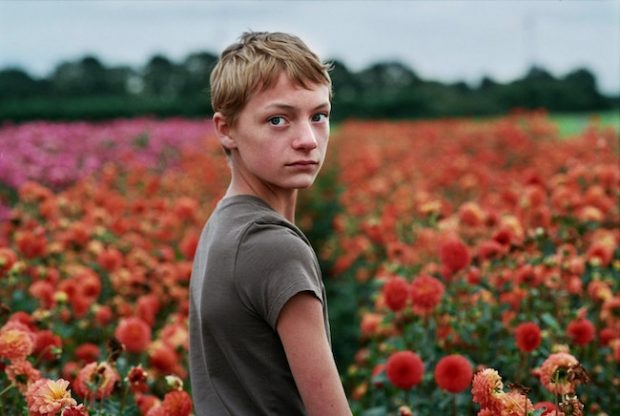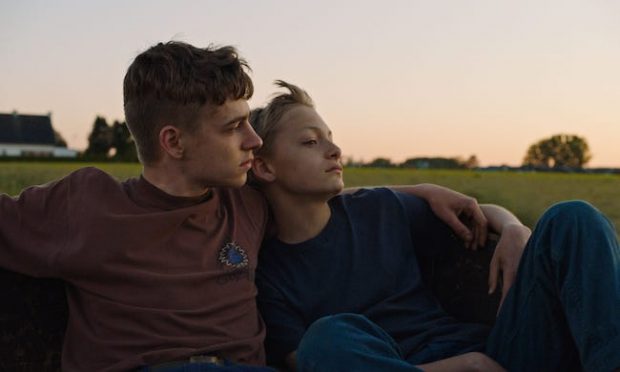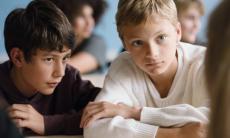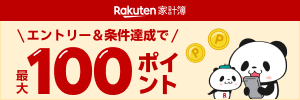『CLOSE/クロース』 ルーカス・ドン監督来日インタビュー/Interview with Lukas Dhont about “Close”
NeoL / 2023年7月13日 20時0分
美しい花畑や田園を舞台に、純粋な少年たちの絆と予期せぬ悲劇、そして再生を描き、第75回カンヌ国際映画祭でグランプリに輝いた映画『CLOSE/クロース』が7月14日に公開される。主人公は兄弟のように育った13歳のレオとレミ。いつも一緒に過ごしていた大親友だったが、中学校に入学した初日、その親密な関係を同級生にからかわれてしまう。レオは周りの目を気にするあまり、レミと距離を置くようになり、2人の心は次第にすれ違い始める…。監督・脚本は、2018年の長編デビュー作『Girl/ガール』で第71回カンヌ国際映画祭カメラドール(新人監督賞)を受賞した、ベルギー出身のルーカス・ドン。性的マイノリティとしての自身の記憶もインスピレーションに、社会規範やレッテルを前に揺れ動く思春期の少年の心を繊細に描き出した。ここでは日本公開を前に来日を果たした監督に、作品に込めた想いを聞いた。
→ in English
――『CLOSE/クロース』はとても私的な作品でありながら、同時に普遍的でもありますね。かつて13歳だった多くの人が、この作品に描かれた感情に共感できるのではないでしょうか。
ルーカス・ドン監督「ありがとうございます。そう言ってもらえて、胸がいっぱいです」
――長編デビュー作の『Girl/ガール』(2018)では、女性であること/女らしさについて描いていましたが、本作では男らしさと親密さというテーマに触れられています。これまであまり多くの映画で語られてこなかったことですが、なぜこの物語を伝えようと思ったのですか?
ルーカス・ドン監督「興味深いことですが、男らしさと親密さは滅多に両立しないようです。私たちは男らしさと(男性の)力強さを混同してしまいがちで、少なくとも最近では、男性を鎧のような存在として捉えることに慣れてしまっています。抱きしめられる必要もなければ、女性と同じように親密さを求めることもない、孤高の人というイメージです。でも、そのナラティブは間違っていると思うんです。13歳の少年たちが話すのを聞いていると、彼らは友だちをとても大切に思っていて、お互いがいなければおかしくなってしまうほどの存在であることや、友だち関係が実はとてもフィジカルなものであることがわかります。
つまり、これは家父長制の中で頻繁に示される、ある種の社会規範との対立であり、あのような優しさを映し出したいという願望でもあります。また、それを喪失すること、あるいは解体することが、私たちにとって何を意味するか、より幅広い視点で示すためのものでもありました。私は2人の幼い少年がベッドをシェアする姿や、それが彼らにとって、ごく自然な状態であることを描きたかったんです。ある種の外部からの眼差しが、片方の少年の考え方に影響を与えるまでは。それによって、あんなにも自然に感じられていたことが、急にぎこちなくなってしまうのです」
――社会の目を通して。
ルーカス・ドン監督「そう、社会の目を通して。親密であることを性的な関係として安直に捉えることに、私たちは慣れてしまったのだと思います」


――この映画を観て思い出したのですが、あの年頃になると子どもの眼差しに変化が生じて、親密な友だち関係に必要のないレッテルを貼り始めたりするんですよね。
ルーカス・ドン監督「その通りです。2人のどちらか、あるいは両方が、自分がどのように見られているかを意識するようになる。かつてのつながりが形を変えるのに要するのは、ただそれだけです。登場人物たちはゲイなのかと聞かれることが多いのですが、私はいつも『わからない』と答えています。私にはわからないし、どうでもいいことなんです。なぜなら、ここで描かれているのは、彼らの間に存在する名前など必要のない愛だから。誰かとつながりを感じるのはとても自然なことで、必ずしもそこにレッテルを貼る必要はないのです」
――今回の来日中に行われたイベントでは、本作はクィア映画なのかという質問もあったそうですね。監督にとって、クィア映画とは何を意味しますか?
ルーカス・ドン監督「私の解釈では、クィア映画とは、(生まれてきた)身体に付随する社会規範や期待されるもの、ジェンダー、役割について描いた作品です。たとえば私にとっては、シャンタル・アケルマン監督の『ジャンヌ・ディエルマン ブリュッセル1080、コメルス河畔通り23番地』もクィア映画です。そこでもまた、私は常にクィア映画“でもある”と言うようにしています。まったくそうではないかもしれないし、人間的な映画とも言えるでしょう。特にレッテルを拒否してきたコミュニティ、あるいは、絶対にレッテルを拒否したいと考えているコミュニティからすると興味深いのですが、世の中ではどういうわけか、物事は常にレッテルを貼るという発想に戻ってしまいます。これがクィア映画か否かという概念は、私たちは何でも分類した方が安心できるというようなものでしょう。非常に興味深いことに、そういったすべてのことから自由になるのは、私たちみんなにとって、とても難しいようです。また、クィア当事者が本作を観たら、クィアではない人たちとは違った捉え方や解釈をするでしょうし、それはまったく問題ありません。大切なのは実際に何と呼ぶかではなく、そこに描かれた人間的な状態なのです」
――各国での反応はいかがでしたか?
ルーカス・ドン監督「国によって異なります。でも、全体を通して興味深いのは、多くの人がこの映画に私的なつながりを見出し、自分の子ども時代の傷を投影していることです。本作は非常に興味深い形で、観客に過去の特定の出来事と和解させ、それを追体験させているようです」


――レオ役のエデン・ダンブリンとレミ役のグスタフ・ドゥ・ワエルが演技初挑戦だったと知って驚きました。エデンのことは電車の中で見つけたそうですが、彼のどんなところに惹かれて話しかけようと思ったのですか?
ルーカス・ドン監督「人生や世の中を生きていく中で、人は理由があって誰かとすれ違うことがあると思うんです。これまでの自分は、そのようなことがあっても行動を起こしませんでした。でも、電車の中でレオを見かけたとき、私はまた理由のある出会いだと感じたのです。そして、行動を起こしたい、この人を見過ごしたくない、話しかけたいと初めて思いました」
――話しかけてよかったですね。
ルーカス・ドン監督「そうですね。それにもちろん、当時は『CLOSE/クロース』の脚本を書いていたので、頭の中に架空の少年がいました。エデンの好きなところは、とてもエレガントで流動的で柔らかい、その立ち振る舞いです。本作は自分の行動をコントロールすることについて描いており、劇中のレオはある時点で、もっとタフに、ハードに世界を駆け抜けたいと思い始めます。エデンはとても柔らかくて愛らしい人なので、自然にそのような動きにならないことはわかっていました。彼がそのような行動をしたら、ちょっとしたパフォーマンスのように感じられるとわかっていたんです。それはとても重要なことだったので、彼のそんなところが気に入りました。それに、エデンの目は信じられないほど力強く、語りかけていて、友人と話す姿を見ていたら非常に表現力豊かだったんです。その目に強く惹かれるものがあったので、話しかけようと決めました」


――2人とは、どのように役作りをしましたか?
ルーカス・ドン監督「隠しごとはしたくなかったので、最初に一度だけ脚本を読んでもらいました。私は彼らと横並びのコラボレーションをしたいと思っていたんです。私たちは劇中のいろんなことについて話し合い、それらにいかに共感するか、もしくはしないかを、2人にオープンに語ってもらいました。それから、脚本はもう2度と読まないようにお願いしたんです。紙に書かれたことをそのまま演じなければならないと思わせたくなかったですし、彼らの創造性が入り込む余地はないとも思わせたくなかった。私は逆にそれを望んでいました。それから6ヶ月間を一緒に過ごす中で、私は彼らに一度読んだ脚本について、たくさんの質問を投げかけたんです。でも、決して答えは与えませんでした。答えを提供するよりも、彼らが納得できる答えを導き出す方が面白いと思ったからです」
――レオとレミの年齢と近い彼らから、意見をもらうことはありましたか?
ルーカス・ドン監督「映画の序盤に、2人がベッドで横になっていて、レオがレミに物語を聞かせるシーンがあります。私たちは当初、隠喩的で美しいと思い、ブラックホールに落ちてしまう男の子についての物語を書きました。でも、脚本を読んだエデンから、『僕なら絶対にあんなことは話さないな』と言われたんです。『君だったら何を話す?』と聞くと、彼は少し経ってから私たちのところへやって来て、『僕だったらアヒルとヘビの話をする』と言いました。私たちは彼の物語を聞いて、本当に素晴らしいと思いました。それは13歳の言葉で語られていたんです。彼はこの映画から感じ取ったすべてのことを自分の言葉で表現しており、私はそのアイデアが大いに気に入りました。彼らからはたくさんの意見をもらいましたし、私たちも大人が子ども向けに書いたセリフではなく、子どもたち自身の創造性に根付いたセリフにするよう心がけました」
――レオがレミの母親と過ごすシーンでは、2人の関係性がとてもリアルに見えました。レミの母親を演じたエミリー・ドゥケンヌは素晴らしい役者ですね。
ルーカス・ドン監督「彼らが親しくなるまでに、私たちはたくさんの時間を一緒に過ごしました。エミリー・ドゥケンヌは15歳で初めての役を演じた女優です。『ロゼッタ』(1999)で主演を務め、カンヌで賞を受賞しました。それだけに、若くして演じるということがどのようなものか熟知しているのです。今回は演技と初めて出会った2人の若者の旅に同行してくれました。彼女は彼らの役に多くをもたらしてくれたので、その過程に寄り添ってくれたことをとても感謝しています」


――映画の前半で2人の少年が花畑を駆け回るシーンは、とても愛らしい、夢のような光景です。監督はなぜあのロケーションを選んだのですか?
ルーカス・ドン監督「私は花畑のすぐ近くで育ったので、あのロケーションは自分の子ども時代を想起させるんです。本作で幼い友情を描こうと思ったとき、花畑が自分にとって象徴的な場所であることはわかっていました。この映画で最初にできたシーンの一つは、真っ暗闇から地下壕にいる少年たちが映し出されるオープニングです。常に男らしさや男性や戦争と結びつけられてきた空間の中で、あのようなボキャブラリーで作り話をしていた少年たち(註:2人は戦争ごっこをしている)が、そこから花畑へと飛び出していく。それは映画全体を通して見られる、残忍さと壊れやすさの並置のようなものなんです。本作は信じられないほど優しいものと、信じられないほど残忍なもの間を行き来する映画だと思っています。そして、より大きな視点から考えると、花畑は人生の儚さを象徴する場所となりました。映画のトーンが変化する中で畑に機械が導入され、花の収穫が始まると、何かが変化していく気配が感じられるはずです。
また、この映画では、時間の経過がとても重要な要素となることも理解していました。花畑は私たちに自然な形で時間の経過を示してくれます。そしてもちろん、花畑は彼らの友情を意味する場所でもあるのです。レオは実体のないものの存在感を強く求めているんだと思います。つまり、私が本当に模索していたのは、大切な人との心のつながりは永遠なのかという疑問でした。私はあの花畑の中に、その答えがあると思っています」
――最後に、本作の公開を楽しみにしている日本の映画ファンに伝えたいことはありますか?
ルーカス・ドン監督「この映画と一緒に再び来日できて、本当にうれしいです。これは文字通り世界の反対側で制作された作品ですので、日本の皆さんが劇場に足を運んでくれて、本作とつながりを感じてくれたら、それはとても光栄なことです。この映画が日本で公開されることを光栄に思っていますし、誰かにとって何か意味のある作品になればいいなと願っています」
text nao machida
『CLOSE/クロース』
7月14日(金)より全国公開
公式HP:closemovie.jp
監督:ルーカス・ドン(『Girl/ガール』)
脚本:ルーカス・ドン、アンジェロ・タイセンス
キャスト:エデン・ダンブリン、グスタフ・ドゥ・ワエル、エミリー・ドゥケンヌ
2022年|ベルギー・オランダ・フランス|104分|ヨーロピアンビスタ|5.1ch|原題:Close|字幕翻訳:横井和子|G
配給:クロックワークス/STAR CHANNEL MOVIES
© Menuet / Diaphana Films / Topkapi Films / Versus Production 2022

――Thank you so much for sharing your beautiful movie with us in Japan. This film is very personal yet it’s universal as well. I think no matter where you are from, many people can relate to the emotions of the film if you’ve been 13.
Lukas Dhont: Thank you. It really fills my heart that you said that.
――Your first film “Girl” was about femininity, and this time you touched on the themes of masculinity and intimacy which hadn’t been talked about in many movies. Why did you decide to tell this story?
Lukas Dhont: It's really interesting but usually, masculinity and intimacy don't seem to go hand in hand. I think we often confuse masculinity with virility. And at least nowadays, we have gotten very accustomed to this idea of men as an armor. A lone ranger that doesn't need to be held or doesn't long for intimacy the same way as a woman. But I think it's a false narrative, because when you listen to 13-year-old boys speak about each other, you're reminded just how important their friends are to them and how they would go crazy without each other, and how physical their relationships actually are.
So it was both confrontation with the sort of canon that we often get represented in a patriarchy and the desire to show that tenderness, and at the same time to show what the loss or the deconstruction of it means to us in a wider perspective. I wanted to see these two young boys share a bed together, and that being the most natural thing to them, until the outside look seeps into one of the boys’ way of looking. And all of a sudden, something that felt so natural becomes awkward.
――Through the lens of the society.
Lukas Dhont: Yeah, through the lens of the society. I think we are very conditioned to look at intimacy quite easily as something sexualized.


――This film reminded me of the emotion that I forgot that I had. I remember when you reach around that age, all of a sudden, kids’ perspectives start changing and they start to put unnecessary labels on relationships between close friends.
Lukas Dhont: Exactly. And it only takes that much to really shape the connection that once was to reshape it in a way that at least one of the two or maybe both become aware of how you are perceived. I've been often asked if these characters are gay. And I always say, I don't know. I don't know and I don't care, because I think it's more about this love between them that doesn't have to have a name. It's just something very organic to feel that connection to someone and not having necessarily a label for it.
――I read that you were asked whether this is a queer film or not at the event in Tokyo. What does a queer film mean for you?
Lukas Dhont: My interpretation of a queer film is about norms and expectations and gender and roles put upon the body. In the same way that for example, for me, "Jeanne Dielman" by Chantal Akerman is a queer film. That again, I always say it's "also" a queer film. Next to that, it's not at all, it's also a human film. What is interesting, especially from a community that has rejected labels, or definitely wants to reject labels, is that somehow in this world, things always come back to that idea of a label. The idea of “Is this a queer film or not?” is like, we feel more comfortable categorizing something. And it's really interesting because breaking free from all that seems to be very hard to all of us. Also, someone who's queer and who's watching this film will have a different take and interpretation, and will read it in a different way than someone who's not. And that's totally fine. I think it's not about what the actual name is. It's more about the human condition of it.
――How did people in different countries react to this film?
Lukas Dhont: I think it really depends on which country. But overall, what has been really interesting is that the film has sparked a lot of personal connection, and a lot of people project their own childhood wounds on here. It has made them reconcile and relive certain things from the past in a way that I think is really deeply interesting.


――Eden Dambrine and Gustav de Waele who played Leo and Rémi were so special. I can’t believe this was their first time acting. I read that you found Eden on the train. What did you see in him that you wanted to talk to him?
Lukas Dhont: Going through life and going through the world, we often pass people for a reason. I think in the past that has happened to me, I didn’t act on it. And when I saw Leo sitting on the train, I again had that feeling of meeting someone for a reason. But I felt for the first time that I wanted to act on it, that I didn't want to let this person pass by, and really wanted to speak to him.
――I'm glad you did.
Lukas Dhont: Yeah, and of course, I was writing "Close" at that moment, so I had this fictional young boy in mind. What I loved about Eden was his way of moving. It was very elegant, very fluid, very soft. And it's a film about the control over behavior, so I knew that this character at one point in the film really starts to want to move through the world more toughly, more shaped and harder. I knew that that didn't come organic to him because he's very soft and sweet, and I knew that him directing his movement like that would feel a little bit like a performance. So I liked that because that was very essential. And his eyes are incredibly strong and speaking, and when he was talking to his friends, I just saw that he had this very expressive way of telling a story. So there was something in his eyes that I was very drawn to and that made me decide to speak to him.


――How did you shape these characters with them?
Lukas Dhont: They read the script only once at the very beginning, because I didn't want to have any secrets from them. I wanted to have a very horizontal collaboration with them. We talked about a lot of things in the film, and they talked in a very open way about how it connected to them or not. Then I asked them not to read the script again, because what I wanted to avoid was that they would think they have to copy something which is on paper, and that there wouldn't be space for their creativity to be a part of the process, which I absolutely desired.
So over the course of six months when we were spending time together, I would ask them a lot of questions about the document they once read, and I would never give them answers. Because I felt like asking them questions and allowing their answers to be the ones that they felt alright with was more interesting for me than serving them an answer to a question.
――Did they give you any insights as they are around the same age as Leo and Rémi?
Lukas Dhont: I remember the scene in the very beginning of the film where Leo tells a bedtime story to Rémi as they were lying in the bed. We had written this story about this boy falling into a black hole in space because we thought it was metaphorical and beautiful. But during our first conversation after they read the script, Eden said, “You know, I would never say anything like that.” It was great because I could ask him, “OK, so what would you say? What would be your bedtime story?” And a little bit later, he came to us, and he said, “I will tell the story about a duck and a lizard.” When we were listening to the story, we thought it was really great, because it was very much in the language of a 13-year-old. He had implemented all these things that he had sensed were in the film through his own words, and I loved that idea. So they really gave us a lot of input, and we made sure that the dialogue was not the one written by an adult for a kid, but it could also stem from their own creativity.
――I really loved the scene with Leo and Rémi's mom because their relationship seemed genuine. Émilie Dequenne is great as Rémi's mom.
Lukas Dhont: We spent a lot of time together before they started to get very close to each other. Émilie Dequenne is an actress who played her first role at the age of 15. She starred in "Rosetta" (1999) for which she won the prize at Cannes. So she very much knows what it’s like to be young and acting. And she also really accompanied these two young human beings for whom it was the very first encounter with acting in that journey of what it would look like. I'm very thankful to her for being so present in the process as she was, because she really delivered a lot to these roles.


――It is very sweet and almost dreamy with the two boys running around in the flower fields in the beginning of the film. Why did you choose that location?
Lukas Dhont: I grew up very close to a flower farm, so that location reminds me of my young years. When I knew that this was going to be a film about a young friendship, I knew that that location represented something for me. One of the very first sequences for the film that came to exist was the opening sequence where it's pitch black and we find these boys in a bunker, in a space that has always been represented or linked to virility, linked to men, and linked to war, and have these boys make up that vocabulary to then see them run out in this field of flowers. It’s a sort of juxtaposition of the brutal and the fragile which you see throughout the film. I think this is a film that really moves between something incredibly tender and something incredibly brutal. And then in the bigger scope, the flower field became this representation of the fragility of life. I think in the shift in tonality, when these machines arrive and cut these flowers from the fields, you feel like something is in the air and something is shifting and changing.
I also knew that the passing of time would be very important in this film. I think these fields gave us this organic way to show that passing of time. Of course, this is a location that defines their friendship. I think Leo is very much looking for a presence without an actual presence. So this question of “Can someone stay close to us even if they are no longer there?” was something I really was looking for. And I think these flower fields had the answer in them.
――Lastly, is there anything you would like to say to the Japanese movie fans who are looking forward to watching this film?
Lukas Dhont: I’m so happy to be back in Japan with this film. I think what is extraordinary is that this film is literally made at the other end of the world. So it would be such an honor that people here would go see it in the cinema and connect to it. I feel very honored that it's being released here, and I hope it may mean something to someone.
text nao machida
関連記事のまとめはこちら
https://www.neol.jp/movie-2/
外部リンク
- 『CLOSE/クロース』 ルーカス・ドン監督来日インタビュー/Interview with Lukas Dhont about “Close”
- 【試写会プレゼント】製作に20年以上を費やした「人類の進化についての黙想」。デヴィッド・クローネンバーグ監督最新作『クライムズ・オブ・ザ・フューチャー』
- 映画『バービー』マーゴット・ロビー他キャスト、監督の来日が緊急決定!超豪華ゲスト集結のLAワールドプレミアレポート&「僕はただのケン!」ライアン・ゴズリングが魂の熱唱
- 清原果耶『1秒先の彼』インタビュー
- 【試写会プレゼント】 家族や仲間が味方でなかったとしても 私は決して、“自分”であることを諦めなかった。A24が送る新鋭監督の実話『インスペクション ここで生きる』
この記事に関連するニュース
-
『ロマンシング サガ2 リベンジオブザセブン』煽り気味の皇帝にも注目!ザコとは違う圧倒的な七英雄との対峙【ゲームで英語漬け#153】
Game*Spark / 2024年12月22日 20時0分
-
Shareholder Proposals to Japan Business Systems, Inc.
PR TIMES / 2024年12月22日 14時40分
-
【愛しとーと】国際機関ESQRの品質優秀ダイヤモンド賞「Quality Choice Prize 2024」を受賞!
PR TIMES / 2024年12月20日 13時45分
-
面接対策から日常会話まで、「日本語のオンラインプライベートレッスン」1月生・2月生の募集を開始!
PR TIMES / 2024年12月11日 17時15分
-
New 7me 【shichi-me】 Seven Blend Spice Now on Sale!
共同通信PRワイヤー / 2024年11月29日 17時0分
ランキング
-
1今年流行った「大人の学び」が明らかに! 2025年に"注目すべきスキル"とは?
マイナビニュース / 2024年12月26日 17時3分
-
2【10年に一度レベルの年末寒波】エアコン暖房の無駄を防ぐ部屋づくりのポイントは? - 節電の基本をダイキンが解説
マイナビニュース / 2024年12月26日 9時31分
-
3トースターでお餅を焼くと中がかたいまま…上手に焼くコツをタイガーが伝授!「予熱」より「余熱」がおすすめ
まいどなニュース / 2024年12月25日 17時45分
-
4「別にいいじゃない」ホテルのアメニティを大量に持ち帰る彼女にドン引き。ファミレスでも“常識外れの行動”に
日刊SPA! / 2024年12月26日 8時52分
-
5【MEGA地震予測・2025最新版】「能登半島地震以上の大きな地震が起きる可能性」を指摘 北海道・青森、九州・四国、首都圏も要警戒ゾーン
NEWSポストセブン / 2024年12月26日 11時15分
記事ミッション中・・・
記事にリアクションする
![]()
記事ミッション中・・・
記事にリアクションする

エラーが発生しました
ページを再読み込みして
ください











